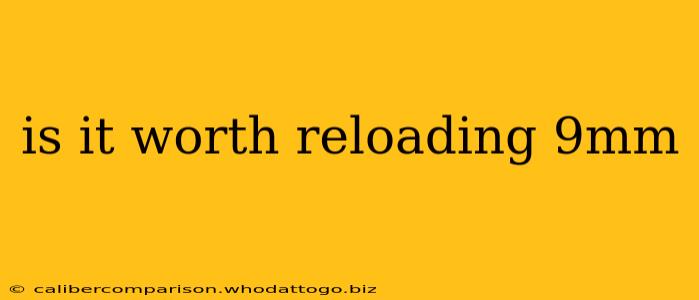The question of whether reloading 9mm is worthwhile is a common one among gun enthusiasts. The answer, like most things, is nuanced and depends on individual circumstances. This guide will delve into the pros and cons, helping you determine if reloading 9mm is the right choice for you.
The Financial Argument: Cost Savings
The primary driver for many considering reloading is cost savings. Factory 9mm ammunition prices fluctuate wildly, often spiking due to increased demand or supply chain issues. Reloading can significantly reduce your per-round cost, potentially saving you hundreds or even thousands of dollars over time, depending on your shooting volume.
Factors Affecting Cost Savings:
- Component Costs: The price of brass casings, primers, powder, and bullets varies regionally and seasonally. Careful shopping and buying in bulk can minimize expenses.
- Equipment Investment: The initial investment in a reloading press, dies, and other necessary tools can be substantial. However, this cost is amortized over time with each round you reload.
- Time Investment: Reloading is a time-consuming process. Factor in the time spent preparing components, loading cartridges, and cleaning your equipment. If your time is valuable, this could offset some of the cost savings.
When Reloading Makes Financial Sense:
- High-Volume Shooters: If you regularly shoot hundreds or thousands of rounds annually, the cost savings of reloading 9mm will quickly outweigh the initial investment.
- Consistent Ammunition Needs: Reloading allows for consistent ammunition performance, crucial for accuracy and reliability, especially in competition shooting.
- Specific Load Development: You can fine-tune your loads to achieve optimal accuracy and performance tailored to your firearm.
Beyond the Budget: Other Advantages of Reloading 9mm
Cost savings aren't the only benefit. Reloading offers several other advantages:
Customization and Control:
- Load Development: Experiment with different bullet weights, powder types, and charges to find the perfect load for your specific firearm.
- Ammunition Availability: Reloading provides a reliable source of ammunition, especially during periods of scarcity.
- Consistent Quality: You control the quality of each round, ensuring consistent performance and reducing the risk of malfunctions.
Improved Accuracy and Reliability:
- Fine-Tuning: Reloading enables you to achieve optimal accuracy by experimenting with different load combinations.
- Reduced Variations: Consistent reloading practices lead to less variation in round performance compared to factory ammunition.
The Downsides: Things to Consider
While reloading offers significant advantages, it's crucial to acknowledge the drawbacks:
- Time Commitment: Reloading is a time-consuming process. Be prepared to dedicate time to learning the process and performing the tasks correctly.
- Safety Precautions: Reloading involves handling potentially hazardous materials. Safety is paramount, requiring strict adherence to proper procedures and safety guidelines. Improper handling can lead to serious injury or even death.
- Equipment Cost: The initial investment in reloading equipment can be substantial. This cost must be factored into the overall equation.
- Learning Curve: Reloading requires learning and mastering specific techniques and procedures. Improper techniques can lead to malfunctions, damage to your firearm, or even injury.
Conclusion: Is Reloading 9mm Right for You?
Reloading 9mm can be a rewarding and cost-effective endeavor, especially for high-volume shooters who value accuracy and customization. However, it's not a decision to be taken lightly. Carefully weigh the financial considerations, time commitment, safety requirements, and the initial investment before deciding. If you're serious about reloading, invest time in learning safe and proper reloading techniques from reputable sources. Ultimately, the decision of whether or not to reload 9mm is a personal one, based on your individual needs and circumstances.

